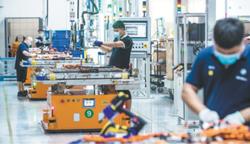 This undated photo shows workers assemble batteries at BMW Brilliance's production line. (PHOTO PROVIDED TO CHINA DAILY)
This undated photo shows workers assemble batteries at BMW Brilliance's production line. (PHOTO PROVIDED TO CHINA DAILY)
BMW Brilliance opened its High Voltage Battery Center II in Shenyang, Liaoning province on Sept 14, demonstrating the joint venture's ongoing commitment to high-quality development and further consolidating BMW's position as an emobility pioneer.
It is BMW Group's first site producing its fifth-generation high voltage batteries that will be equipped on the pure-electric BMW iX3, which made its China debut in Shenyang on Sept 13.
The model will be made at BMW Brilliance's Dadong plant in Shenyang and sold globally.
Established in 2017, the High Voltage Battery Center of BMW Brilliance was the first BMW facility outside of Germany with complete battery production capabilities, including R&D, laying a solid foundation for further localized production of new energy models.
The newly-opened HVB Center II more than doubles the original battery production capacity and has space reserved for future capacity growth, according to the carmaker.
ALSO READ: BMW, Alibaba to build innovation base to foster, incubate startups
BMW Brilliance also began construction on a major extension of its R&D Center at its Tiexi plant in April. The R&D Center specializes in new energy vehicle development.
Milan Nedeljkovic, a member of the board of management of BMW AG for production, said: "China is of great importance to the BMW Group, both as a market and as a production and innovation location.
"We are preparing for future growth: With this expansion of the battery plant, we have more than doubled the capacity of the local battery production in China."
China is of great importance to the BMW Group, both as a market and as a production and innovation location.
Milan Nedeljkovic, a manager of BMW AG
Johann Wieland, president and CEO of BMW Brilliance Automotive, said: "The expansion of our High Voltage Battery Center is a concrete demonstration of our commitment to continue our investment in Shenyang, Liaoning and Northeast China. It also shows our determination to lead the way in sustainable mobility, as we launch our pure-electric BMW iX3 in China, for China and for the world."
BMW Group is continuing to push ahead with the expansion of electric mobility and aims to introduce 25 electrified models by 2023. More than half of these will be fully-electric.
BMW Group said it follows a strategy of in-house development of all key technologies of the electric-drive. It launched its Battery Cell Competence Center in Munich in Germany last November with planned investment of 200 million euros (US$235.77 million), aiming to advance battery cell technology and introduce it into production processes.
Building on knowledge gained from these operations, BMW will bring optimal battery cell technology to series maturity within the shortest implementation time possible and enable suppliers to produce cells to its exact specifications.
Despite required investment and technologies, the major advantage of in-house battery production is greater control over the battery manufacturing process, the carmaker said.
With the new facility, BMW Brilliance is able to optimize the quality, safety, durability and efficiency of its battery products in the manufacturing process.
Wieland said that as a carmaker with more than 100 years of history, one of the basic concepts of BMW is quality always comes first. The carmaker has carried out a lot of research and testing to ensure its products are high-quality and high-performance.
According to the joint venture, the high voltage battery production process in the HVB Center II is divided into two main stages: first, supplied battery cells are manufactured into modules, after which the modules are assembled into battery packs.
The highly automated module production line adopts a range of high-tech processes, such as cell painting and foil and spacer application to ensure that the battery cells are insulated and isolated from each other.
The center also utilizes advanced technologies, such as laser and plasma cleaning, laser welding, and artificial intelligence camera systems at different stages to ensure reliable and consistent production quality.
After the modules are produced, they are assembled into battery packs. A highlight of the pack line is its innovative use of automated guided vehicles. Rather than the traditional conveyor method, the programmed AGVs transport the heavy battery packs from station-to-station along the pack line.
Franz Decker, senior vice-president of technology and manufacturing at BMW Brilliance, said that the transportation system offers high flexibility as AGVs can be simply reprogrammed according to production requirements. Such flexibility reserves space for future development and growing volume demand.
At each station, qualified high voltage battery technicians load, mount and connect the battery modules together with connectors, battery management units and cooling units into the aluminum housing to assemble a complete high voltage battery pack.
Decker added that the batteries undergo leakage testing, and low and high voltage testing throughout the production process to ensure the best quality standards.
READ MORE: BMW project teaching traffic safety to children
When all stages are completed, the fifth-generation high voltage batteries will be transported to BMW Brilliance's Dadong plant in Shenyang for the final assembly of the BMW iX3.
Despite the challenges of COVID-19 in the beginning of this year, the plants in Shenyang had to lockdown for only two weeks. The business recovered in April and should achieve positive growth for the whole year, Wieland said.
"China is the most stable market around the world. We are confident in the long-term development in the country," he added.
Contact the writer caoyingying@chinadaily.com.cn


